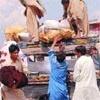
refid:11603524 ilişkili resim dosyası
Turkish FM plans visit to Pakistan
Thousands of terrified Pakistanis dodged Taliban roadblocks yesterday to flee from a northwestern valley as helicopters and warplanes pounded suspected militant hideouts in an operation that has been praised by the United States.
Destabilizing violence is flaring up in Pakistan just as its embattled president appeals to Washington for more help to reverse the expansion of Taliban-held territory to within 100 kilometers of the country’s capital.
In perhaps his most ambitious White House summit thus far, U.S. President Barack Obama met Wednesday with Pakistani President Asif Ali Zardari and Afghan President Hamid Karzai and promised a "lasting commitment" to defeat al-Qaeda and its extremist allies. While Obama hailed "unprecedented cooperation" between Washington, Islamabad and Kabul to fight Islamic militants, he also cautioned that the path to success would be slow and unsure.
"The road ahead will be difficult. There will be more violence, and there will be setbacks," Obama was quoted by the Associated Press as saying after his meetings with the two leaders. "The United States has made a lasting commitment not only to defeat al-Qaeda, but also to support the democratically elected sovereign governments of both Pakistan and Afghanistan. That commitment will not waver, and that support will be sustained."
The U.S. is particularly concerned about the unrest because its troops are fighting an increasingly virulent insurgency in Afghanistan that is being fed by militant havens in Pakistan's lawless border area.
Pakistani officials are bracing for a mass exodus from Swat, a former tourist destination where fighting has resumed after a controversial peace pact broke down earlier this week. The military claimed to have killed more than 80 militants in the region on Wednesday.
Tens of thousands of Pakistanis driven out of other regions of the northwest by the fighting are already living in makeshift camps or with relatives, adding a growing humanitarian crisis to the country's daunting security, economic and political problems. About 40,000 people have been displaced from Swat and nearby areas since the conflicts flared last month, authorities said, adding that up to 800,000 people could seek to flee from the valley, which has a population of about 1.6 million. The U.N. yesterday expressed its concern about the safety of tens of thousands more displaced by the latest violence.
Taliban militants were roaming the streets of Mingora, Swat's main town, yesterday as troops launched artillery and air strikes on militant targets in the area. When the army announced it was relaxing its blanket curfew over the region, many of the people who had hunkered down in their homes decided to make a swift exit. Aid workers warned that the crisis was escalating in the area after families streamed out of the Taliban stronghold on foot or crammed into cars weighed down with provisions and household possessions.
"A mortar shell hit the outer wall of my house last night. Luckily, we survived," Nasir Jamal, a medical-shop owner, told Agence France-Presse. "I feel God has given me an opportunity that I can't miss. I'm leaving. Swat is not worth living in." Several civilians said they were heading for camps set up by Pakistani authorities and the U.N. But other residents said the Taliban had blocked their attempts to escape. Ayaz Khan said he loaded his family into his car yesterday in the Kanju area of Swat, only to find that rocks, boulders and tree trunks had been laid across the roads, forcing him to turn back. "I am helpless, frustrated and worried for my family," he told an AP reporter by telephone from his home.
Top cleric’s son killed
Meanwhile, a son of the pro-Taliban cleric who signed the February peace agreement was killed when fighter jets bombarded an area in Lower Dir, a district adjacent to Swat, a spokesman for the cleric said. Maulana Kifayatullah, 50, the eldest of Sufi Mohammad’s 12 sons, was killed and his brother-in-law suffered leg wounds, spokesman Ameer Izzat Khan told Agence France-Presse.
Analysts said Pakistan might stand by its February decision to grant Islamic law, or Shariah, to three million people in the northwest, but that a short-lived ceasefire was over. "The militants are occupying government buildings and security forces are taking action against them, so where is the peace deal?" political analyst Shafqat Mahmood asked. The agreement in Swat was supposed to end the bloodshed after a violent Taliban uprising lasting nearly two years.
U.S. has said it wants to see a sustained operation in Swat and its surrounding districts. Eight years after the Sept. 11, 2001 attacks, the area remains a haven for fighters blamed for the spiraling violence in the region. But uprooting the insurgents from the valley will mean creating civilian casualties, property damage and massive disruption that could sap the resolve of the government, which is struggling to convince the nuclear-armed Muslim nation that fighting the militants is in its interests as well as those of the United States.